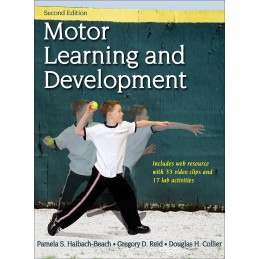- Obniżka


 Dostawa
Dostawa
Wybierz Paczkomat Inpost, Orlen Paczkę, DHL, DPD, Pocztę, email (dla ebooków). Kliknij po więcej
 Płatność
Płatność
Zapłać szybkim przelewem, kartą płatniczą lub za pobraniem. Kliknij po więcej szczegółów
 Zwroty
Zwroty
Jeżeli jesteś konsumentem możesz zwrócić towar w ciągu 14 dni*. Kliknij po więcej szczegółów
Motor Learning and Development, Second Edition With Web Resource, provides a foundation for understanding how humans acquire and continue to hone their movement skills throughout the life span. These fundamentals will give students the tools they need to create, apply, and evaluate motor skill programs for learners and clients at all skill and development levels, from elite athletes to those with severe disabilities.
The second edition maintains the unique focus of the original, covering the basics of motor learning and development simultaneously. The text has been revised and updated with current research and examples, and it includes the following enhancements::
• Three new chapters, Understanding Movement Control, Infant Motor Development, and Devising a Plan, provide more depth on fundamental topics.
• A web resource for students includes videos with guiding questions, lab activities for each chapter, and printable versions of the books sidebars for use as assignments.
• Reorganized content in part I allows for deeper understanding of complex topics.
• Parts II and III are reorganized to group content by topic rather than by age group, in order to better infuse the two fields of motor learning and motor development.
• Updated What Do You Think? and Try This sidebars engage students in applying concepts, and sample answers in the instructor guide help provide feedback on those applications.
Motor Learning and Development, Second Edition, combines these two subdisciplines of motor behavior in an accessible and easy-to-follow manner. Part I provides an outline of the fundamental concepts of both motor learning and motor development. Part II explores movement patterns across the life span, from infancy to older adulthood, with a new chapter focusing on infant motor development. Part III examines the changing individual constraints throughout the life span, including physiological, psychological, and sociocultural factors and changes related to age. Finally, part IV prepares students to create and implement developmentally appropriate movement programs, closing with a new chapter, Devising a Plan.
Learning aids throughout the book include chapter objectives, glossary terms, and supplemental activities to emphasize the evolution from research to practice. Revised opening vignettes in each chapter demonstrate the breadth of professions that utilize knowledge of and research in motor behavior. The significantly upgraded instructor ancillaries—an instructor guide, test package, and presentation package—are free to course adopters.
Motor Learning and Development provides students with the fundamental understanding of movement skills that they need in order to develop, implement, and critically assess motor skill programs.
Opis
Part I. Theory and Foundational Concepts
Chapter 1. Perspectives in Motor Behavior
Defining Terms in Motor Behavior
Motor Control
Motor Learning
Motor Development
Summary
Learning Aids
Chapter 2. Understanding Movement Control
Reaction Time
Attention
Arousal
Sensory Contributions
Memory
Summary
Learning Aids
Chapter 3. Theoretical Constructs in Motor Behavior
Information-Processing Theory
Ecological Approach
Dynamic Systems Approach
Summary
Learning Aids
Chapter 4. Stages of Skill Acquisition
Mountain of Motor Development
Motor Learning Stages
Link to Dynamic Systems Approach
Practical Use of the Learning Models
Summary
Learning Aids
Chapter 5. Assessing Motor Learning
Indicators of Motor Skill Learning
Performance and Learning Tests
Games Classification for Promoting Transfer
Promoting Positive Transfer for Any Motor Skill
Summary
Learning Aids
Part II. Life Span Physical Activity and Movement
Chapter 6. Infant Motor Development
Prenatal Development
Sensory Capabilities
Early Movements
Infants at Risk
Assessment
Summary
Learning Aids
Chapter 7. Fundamental Skills in Childhood
Fundamental Movement Skills
Fundamental Locomotor and Manipulative Skills
Summary
Learning Aids
Chapter 8. Movement in Adulthood
Aging
Physical Activity
Peak Athletic Performance
Movement Patterns
Summary
Learning Aids
Part III. Functional and Structural Constraints
Chapter 9. Physical Development
Nature and Nurture
Physical Growth and Maturation
Body System Constraints
Summary
Learning Aids
Chapter 10. Physical Aging
Skeletal System
Muscular System
Aerobic Capacity
Cardiovascular System
Nervous System
Endocrine System
Body Composition
Sensory Systems
Summary
Learning Aids
Chapter 11. Cognitive Development
Intellectual Development
Types of Knowledge
Attention
Memory
Sport Expertise
Summary
Learning Aids
Chapter 12. Psychosocial and Social–Affective Development
Psychosocial Constraints
Social–Affective Constraints
Self-Regulation
Summary
Learning Aids
Chapter 13. Psychosocial and Cognitive Factors in Adulthood
Psychosocial Factors
Cognitive Function
Summary
Learning Aids
Part IV. Designing Developmentally Appropriate Programs
Chapter 14. Physical, Affective, and Instructional Factors
Gold Standards Versus Variability
Physical Factors
Affective Factors
Instructional Factors
Summary
Learning Aids
Chapter 15. Prepractice Considerations
Goal Setting
Demonstrations
Verbal Instruction
Directing Attention and Providing Guidance
Summary
Learning Aids
Chapter 16. Practice
Amount of Practice
Variable Practice
Contextual Interference Effect
Practice Specificity
Part and Whole Practice
Mental Practice and Imagery
Distribution of Practice
Summary
Learning Aids
Chapter 17. Feedback
Functions of Feedback
Types and Modalities of Feedback
Providing Effective Feedback
Summary
Learning Aids
Chapter 18. Devising a Plan
Ecological Task Analysis
Case Studies
Summary
Learning Aids
